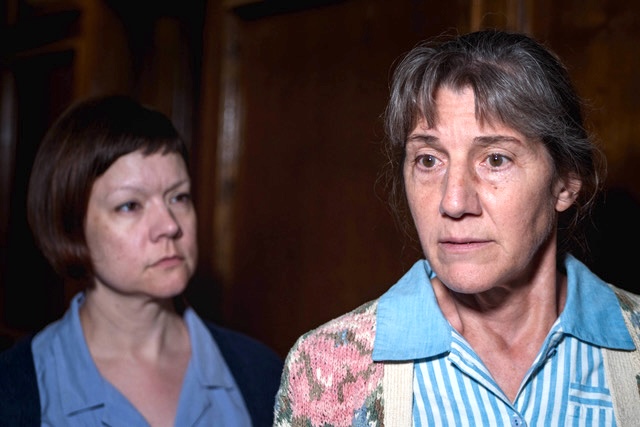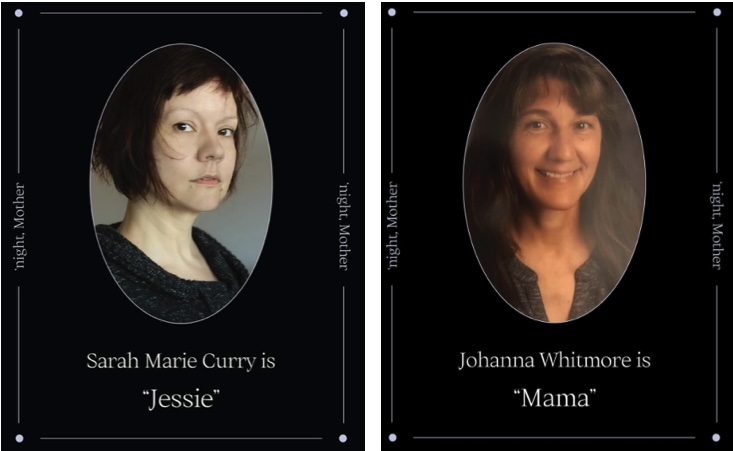Review: 'Night, Mother by Alchemy Theatre Company, Austin
by Michael Meigs
I can't go on.
I won't go on.
Spoken out against difficulty and pain and the enigma of Why must I be here?, those statements convey entirely different messages. I can't is a wearied cry against a life perceived as meaningless, a collapsing into inertia. I won't is defiance and determination to take arms against a sea of troubles and by opposing, end them.
The theme is as ancient as literature. Socrates and hemlock; Hamlet pondering a bare bodkin. Most of Samuel Beckett's work, including the last sentences of The Unnameable:
You must go on.
I can’t go on.
I’ll go on.

Alchemy Theatre places that eternal dilemma right before your eyes in the closed, lonely world of Marsha Norman's 'night, Mother. The title is the Sarah Marie Curry's last line in the drama as she exits to her character's room and locks the door behind her. Curry is Jessie Gates, who has lived with her widowed mother Thelma after a divorce a decade earlier. Johanna Whitmore is Thelma, a simple woman whose unexpected depths are revealed in the flawlesly written and delivered dialogue of this piece.
The short, often disconnected exchanges between these two women focus on immediate concerns but drop comments that gradually fill in the small world around them. That divorce; a teenage son gone bad who's disappeared; a brother only half-interested in these two; the quiet, inexpressive father, a farmer who died years ago, leaving very little trace behind him. Jessie, the younger woman, is subject to epileptic attacks. We meet her busily cataloging items and informing her mother of the routines she's has set up over the years to make this household function. Her mother Thelma has few interests, no apparent depth, maybe one woman friend, and a weakness for the store-bought sweets stocked in big jars in the pantry. The purposeful ordinariness of their exchanges takes a quiet, equally purposeful direction when Jessie follows her mother's directions to locate a pistol hidden in a shoebox in the attic. She already has the ammunition.
In his program note director Michael Cooper explains the decision to leave this 1983 Tony-and-Pulitzer-prize winner solidly in its time period. Few people talked about mental illness at that time; anti-depression medications came available only late in that decade. The discussion between these two women of suicide is direct and anything but philosophical. Having created vivid characters in a rural setting, playwright Norman pits life against death in the most vivid terms imaginable.
Jesse is unapologetic and determined; she has carefully and thoroughly made arrangements that will allow her mother to live alone and generally unassisted. Thelma reasons with her, raising in simple terms the fundamental, terribly complex philosphical questions we all must face someday. Why not go on? Why end it? Can't you look forward to better days? Won't things work out somehow? What if death brings not silence and oblivion but an unending experience more similar to clanging alarm clock that won't ever stop? Thelma is unafraid of her own death, likely to occur far sooner than a natural death for Jesse.
The younger woman has set her schedule and allowed herself time for some challenging questions. She asks about love; she asks about her own illness; she wants to know why the neighbor woman and even her brother avoid her. Her mother Thelma's answers provide a view into Thelma's own world, an existence of many years that seems as barren as her daughter's. And yet, she has endured. She must go on. Jesse, however, meets despair with determination but also with indifference. She won't go on.

Curry and Whitmore are deeply invested in these complex characters, and they are eloquent far beyond the script. Jesse's fortitude and thoroughness; Thelma's quick but forgiving temper; a reconciliation as the end of the drama approaches. I recall only a single moment when Jesse touched her mother, once they'd come to an agreement on how things would proceed.
This ninety minutes is rich in emotion and ultimately heart-rending. This is where someone should intervene, the cry resounds in your mind. These two are too vital, too sensitive, too alive to have to endure this situation, this confict, this oppression.
The long, moving sequence after Sarah Marie Curry's exit line is almost unbearable. Johanna Whitmore in that moment embodies all the profound emotions we feel for those we love, even if we might not understand their pains.
'Night, Mother
by Marsha Norman
Alchemy Theatre Company
October 16 - October 26, 2025
October 16 - 26, 2025
Whisenhut Stage, Zach Theatre, Austin
Tickets can be purchased HERE or on The Alchemy Theatre website at www.thealchemytheatre.org. Discounts are available for seniors, military, students, and groups of eight or more.
